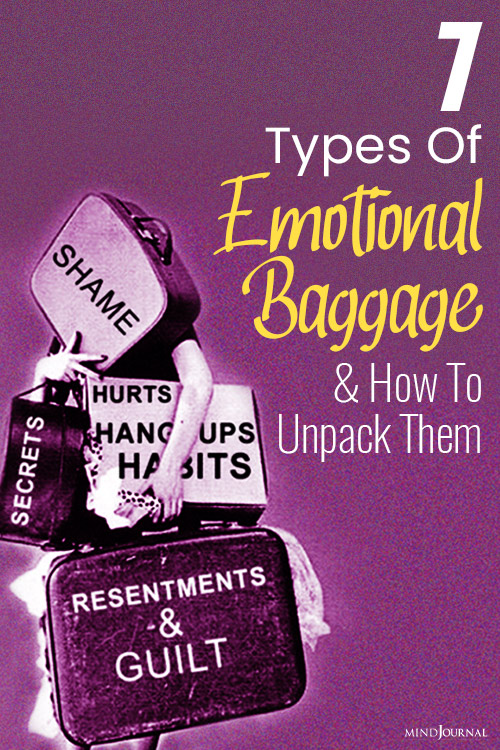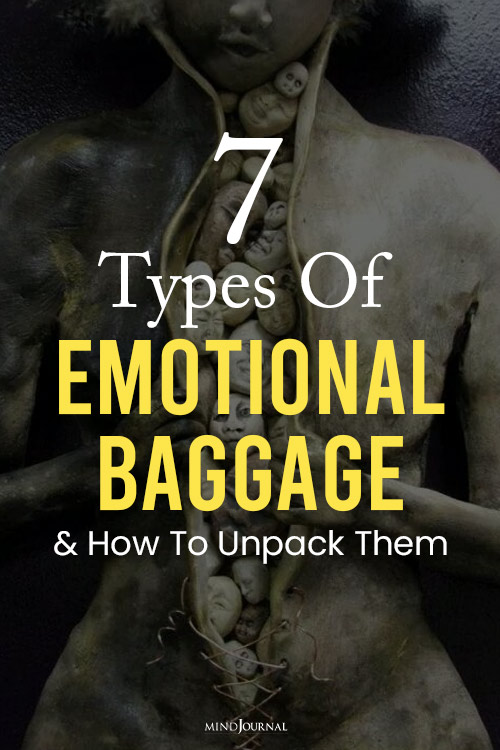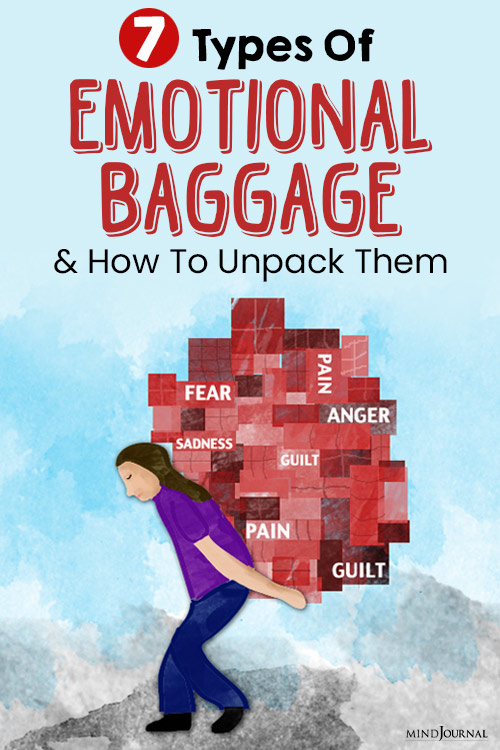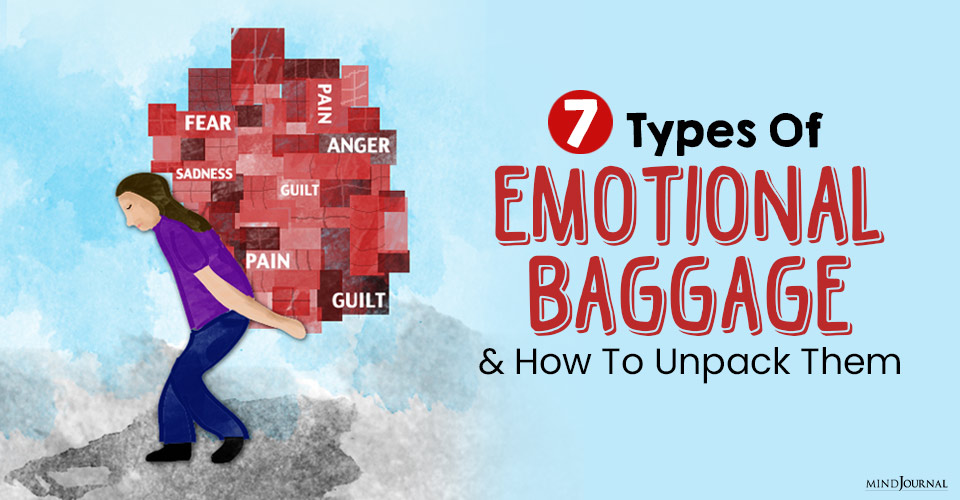Do you find yourself ending up in similar dead-end situations or feel that you always get the short end of the stick? Do you keep attracting the same kind of toxic partner time and again? Chances are you are carrying one or more types of emotional baggage, meaning you are stuck in a pattern, and you need to unpack right now!
Although the term “emotional baggage” has become quite mainstream, just like our travel baggage, they are unique to each of us. As the types of emotional baggage vary, so do their effects. If you think you or your loved one might be carrying some unwanted load that is stopping you to live your best life, read on!
What Is Emotional Baggage?
Emotional baggage is a metaphor to describe our emotional stress or burden that though originated in the past, we still carry its residual energy in the present. It is essentially our unresolved mental blockage that dictates our behaviors and influences the life choices we make. A study says our emotional baggage can prevent us from making better life choices.
For instance, if you have suffered neglect or abuse in your first romantic relationship, it might have scarred you so deeply that you have grown to become hyper defensive regarding your heart. As a result, you keep seeing red flags in all your relationships and drive away perfectly good suitors.
What Are The Different Types Of Emotional Baggage?
As we have already covered that there are several types of emotional baggage, now let’s look at the most common ones and learn to deal with each one of them.
1. Inner-Criticism
Often times when we grow up with overbearing parents who keep dishing out a volley of criticism and derogatory remarks with little to no encouragement or positive reinforcement, we lose our confidence in our potential. We become our harshest inner-critics and remain so even after we grow up.
We need to resolve this toxic pattern so that we can have a healthy self-image and can take decisions that are ideal for us, not for impressing anybody else. Our parents wrongly assumed that their negative comments would inspire us to apply ourselves more in our academics or sports, but we must not give any power to that kind of unhealthy behavior and must never carry the cycle on to our next generation.
Related: How Does Shame From Toxic Childhood Stress Still Harm Us?
2. Psychological Trauma
Psychological trauma, such as Post Traumatic Stress Disorder (PTSD) can leave deep-rooted and long-lasting behavioral and emotional implications. Trauma severely affects our Emotion Regulation, causing us to feel overwhelmed and anxious whenever we get the slightest trigger that reminds us of the dreaded incident. We can manifest traumatic responses through physical, cognitive, or emotional symptoms, including flashbacks, outbursts, nightmares, and so on.
It is ideal to seek medical intervention and therapy to cope with psychological trauma. Mental health professionals can help us to process these haunting memories of ours so that they don’t consume us or control our lives.
Related: Structural Dissociation: How Complex Trauma Causes A Split In Our Being
3. Grief
Losing a friend or family member to death is one of the most difficult experiences of life and it is absolutely natural to go through a grieving process. However, if we don’t allow ourselves this period of processing our loss or somehow fail to resolve our grief in absence of a nurturing environment, we may fail to get on with our lives.
Thus, it is important to take time and process our feelings so that our love for the parted loved one does not pose a threat to our emotional well-being. If we want to move on with our lives, we must seek the support of our friends and family while we go through this grieving process.
Related: The Stages Of Grief: Ways To Cope With Loss and Minimize The Pain
4. Resentment
When we face unfair or unfavorable circumstances for no fault of ours, it is but natural to develop a feeling of resentment or anger. This anger can be directed towards specific people, such as our parents, teachers, coaches, or society, community, cultural practices, and such. Nonetheless, if we let this resentment grow and continue to influence our minds, we will project our unresolved emotions onto others who do not deserve this treatment.
Therefore, we should identify from where our anger is stemming out and take some healthy measures to resolve it. We can confront the person who is responsible for our pain and make them realize in a peaceful way, how they have hurt us, we can forgive and let go of the anger.
Related: Why You Are Frustrated And Angry All The Time: 5 Psychological Reasons
5. Fear
Our fear emotions are triggered when we perceive a danger. Fear is supposed to prepare our bodies to face the perceived threat or attack. However, according to research, “dysfunction in fear processing can lead to psychiatric disorders in which fear outweighs the danger or possibility of harm.” This gives birth to phobias which are debilitating conditions that if left untreated prevent us to live a normal life.
It is not easy to face our fears but if we can approach to manage our fear methodically and take support from our loved ones as well as from experts, we can live our lives more productively. We can do what scares us the most but in a controlled and safe environment.
Related: 33 Lies Your Anxiety Tells You
6. Guilt
Guilt, shame, or regret can be quite a silent killer. If someone fought with a parent right before they passed away, or if a husband cheats on his wife and loses her forever in the process, the feeling of guilt can eat them up from inside. And this shame and regret will have detrimental effects on their self-image. It will become difficult for them to speak their mind or forge another romantic relationship, respectively.
Although guilt indicates that the person has acknowledged their mistake and wants to make changes, unresolved guilt can mar the prospect of a healthy future. We must understand that as human beings we are bound to make mistakes and be compassionate with ourselves. We need to identify where we go wrong, make amends, and do better next time. If we fail we will try again.
Related: A 5-Step Guide To Escape The Guilt Trap
7. Failure
The most common side effect of heartbreak is the emotional baggage of suspicion, paranoia, poor self-esteem, etc. Similarly, if we fail to get good grades at school, or fail to bag a lucrative job offer, sometimes we get into the thinking of either “we are not good enough” or “we are unlucky”. Obviously, both are self-limiting false narratives that we feed ourselves.
Success can never be guaranteed and our failure doesn’t have to be the ultimate reality. We need to be objective about our life and take the power back, rather than blaming ourselves or our stars. If we learn our lessons from a failure and try again, we can make significant progress in our career and personal lives.
Related: Valuable Lessons From Pain: 10 Ways My Pain Helped Me Grow
How To Tell Whether You Have Emotional Baggage?
Some common signs of emotional baggage are:
- Emotional instability
- Frequent job-hopping
- Commitment issues
- Paranoia or anxiety
- Feeling of insecurity
- Always feeling dissatisfaction
It’s Good To Travel Light
Once we identify our emotional baggage we can take steps to unload these unwanted energies that keep us from flying high. If your partner or a family member has one or more of the above-mentioned types of emotional baggage, please help them unpack.











Leave a Reply
You must be logged in to post a comment.